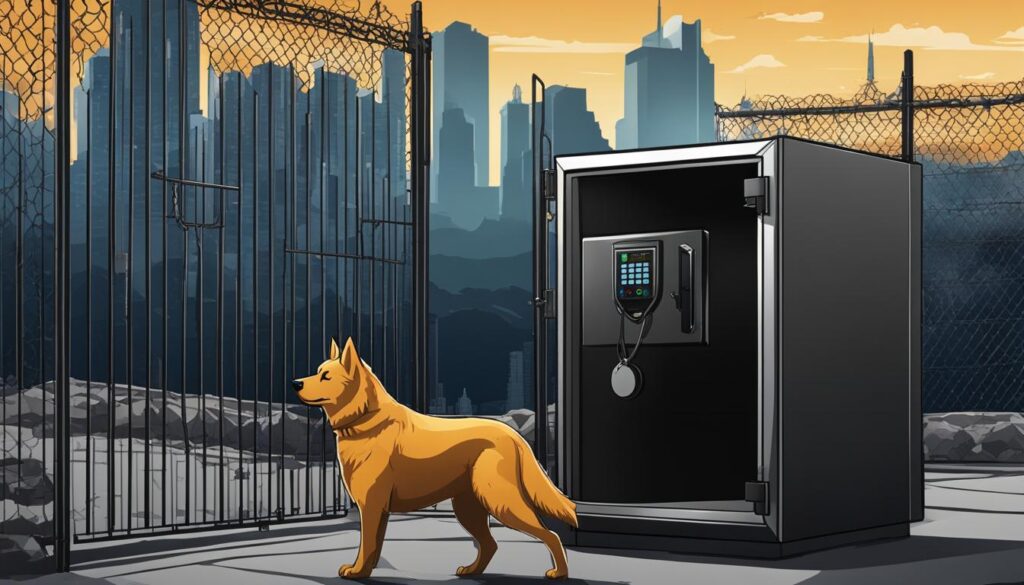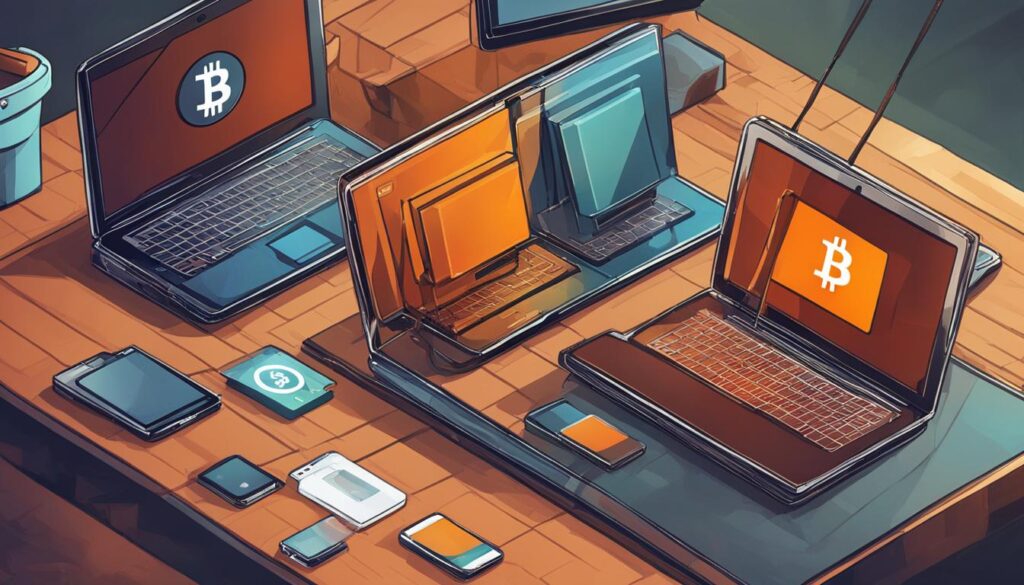Welcome to the dynamic world of cryptocurrency, where the potential for substantial returns is paralleled by the necessity of stringent security! If you’re poised to embark on the adventure of buying and storing Bitcoin, it is critical to get acquainted with the integral components of crypto management: wallets and secure storage techniques.
Forgetful moments like the one experienced by Stefan Thomas, who lost access to 7,002 Bitcoins, underscore the non-negotiable importance of having a fail-safe crypto storage strategy. In this comprehensive guide, we’ll navigate the digital landscape to equip you with actionable steps and knowledgeable insights for securing your Bitcoin investments with confidence.
Key Takeaways
- Understand why traditional bank accounts can’t hold cryptocurrencies, necessitating the use of specialized crypto wallets.
- Learn the importance of choosing the right wallet for your Bitcoin, balancing between accessibility and security.
- Explore the various types of crypto storage options such as hot wallets, cold storage, and exchanges.
- Grasp the steps required to safely store your Bitcoin in different wallet types, including exchange, cold, and hot wallets.
- Discover best practices in selecting secure exchanges and wallets to prevent potential losses.
- Prepare to perform thorough due diligence checks to identify legitimate platforms and avoid scams.
- Familiarize yourself with crypto regulations to ensure your investment activities comply with U.S. laws.
Understanding Bitcoin and Secure Purchase Practices
As lines of complex digital code, Bitcoin and other cryptocurrencies demand a fortified approach to security – one that goes beyond traditional financial safety measures. Knowledge of technical protections and a dedication to meticulous security practices are not just recommended but imperative in the realm of digital currencies.
The first guideline in protecting your Bitcoin is to avoid storing substantial amounts in custodial wallets provided by exchanges. Despite their convenience, such wallets are prime targets for cybercriminals. The dramatic hacks of prominent platforms have illustrated the dire consequences of misplaced trust in online storage.
Remember: storing your Bitcoin on an exchange is akin to leaving your valuables in a glass house. Encase your digital wealth in layers of security instead.
For larger amounts or long-term Bitcoin holdings, enlist cold storage solutions. A hardware wallet, akin to a specialized USB device, or a dedicated computer sans internet connectivity, offers an impregnable fortress for your digital assets.
Implementing vital security measures such as strong password protocols, two-factor authentication (2FA), and encrypting your wallet increases the resilience of your Bitcoin against cyber-theft. Yet, even the sturdiest defenses require vigilant upkeep. Regularly backing up your wallet and updating security measures are not mere suggestions; they are essential habits for any Bitcoin investor.
| Security Measure | Function | Impact |
|---|---|---|
| Hardware Wallet | Stores Bitcoins offline, immune to online attacks | Greatly reduces risk of theft |
| Strong Encryption | Protects wallet with a complex algorithmic code | Keeps unauthorized users out |
| Regular Backups | Maintains up-to-date copies of wallet data | Ensures recovery in event of hardware failure |
| Two-Factor Authentication (2FA) | Adds an extra layer of verification | Protects against compromised passwords |
Reduced to its essence, the security of your Bitcoin hinges less on the currencies’ digital nature and more on the tangible steps you take to safeguard it. The blockchain is inherently secure; it’s our point of interaction with it that necessitates eagle-eyed scrutiny and a proactive defense strategy.
Secure purchase practices aren’t just about avoiding potential threats; they empower you with the confidence to navigate the cryptocurrency market with assurance and poise.
Choosing the Right Bitcoin Wallet for Secure Storage
When diving into the world of Bitcoin, one of the fundamental decisions you will make is choosing the appropriate wallet to secure your investment. This selection is pivotal, impacting not just the safety of your digital currency, but also the ease with which you can engage in transactions. Let’s explore the nuances between hot wallets and cold wallets, as well as other Bitcoin wallet options, guiding you to the optimal choice for your needs.
Hot Wallets vs. Cold Wallets: Pros and Cons
Hot wallets, renowned for their connectivity convenience, are digital wallets that operate on internet-connected devices, like smartphones and computers. This constant access to the Internet streamlines transactions, making them ideal for frequent traders and small-scale investors. However, the trade-off for convenience is an increased vulnerability to cyber threats and unauthorized access. On the flip side, cold wallets offer heightened security by remaining offline, making them less susceptible to online attacks and a safe haven for larger investments. While they ensure robust protection, cold wallets may present challenges such as higher costs and more complicated setup and transaction processes.
Bitcoin Wallet Options: From Paper to Hardware

In the diverse vault of wallet types, from paper to hardware, you’ll find a spectrum of security features and accessibility levels. Paper wallets, though less prevalent today, offer offline storage by physically printing your private keys and Bitcoin addresses. The risk here lies in the loss or destruction of the paper, which can lead to an irreversible loss of funds. Conversely, hardware wallets, such as Trezor or Ledger, provide a portable and secure solution to store your Bitcoin, combining the safety of cold storage with the portability of a USB device.
Wallet Options at a Glance:
| Wallet Type | Accessibility | Security Level | Cost Implication |
|---|---|---|---|
| Hot Wallet | High | Lower | Free to Low |
| Cold Wallet | Lower | Higher | Variable |
| Paper Wallet | Lowest | High (If kept safe) | Minimal |
| Hardware Wallet | Medium | Highest | Moderate to High |
The Importance of Wallet Backup and Recovery Tools
The significance of backup and recovery tools cannot be overstated in the realm of Bitcoin storage. A backup ensures that you retain access to your funds even in the face of device failure, loss, or theft. Utilizing recovery tools like mnemonic seed phrases – a series of words generated by your wallet – provides an extra layer of security in recovering your Bitcoin should your hardware become compromised. It’s crucial to store this information in a secure location, discreet from prying eyes and potential threats. Always remember, your ability to recover your investment hinges on the safety of your backup and recovery tools.
“Just as the essence of Bitcoin lies in its decentralization and autonomy, the soul of its security lies in the measures you implement to protect it.”
Ensuring the Security of Your Bitcoin Transactions
Entering the realm of Bitcoin inevitably beckons a crucial awareness of how to securely conduct transactions. This segment lays the groundwork for practices that will fortify your Bitcoin troubleshooting endeavors. It’s an instructional vault, unlocking the techniques to give your transactions a sturdy barricade against digital miscreants.
Diligent strategies, such as encrypting sensitive transaction data and confirming the integrity of network connections, are just the tip of the iceberg. In an environment as unpredictable as the crypto market, securing your transactions is akin to safeguarding your digital DNA—the groundwork of your virtual existence.
Moreover, it’s paramount that enthusiasts reflect on exchanges that diligently prioritize security measures tailored for the end-user while offering reparation guarantees in the unfortunate event of compromised funds. While they may be intangible, there’s nothing ephemeral about the steps needed to safeguard your Bitcoin transactions—they are real and vital.
| Consideration | Action | Benefit |
|---|---|---|
| Encryption | Apply robust encryption to transaction data | Keeps sensitive information secure from third-party interception |
| Secure Connection | Use trusted networks, avoid public Wi-Fi for transactions | Reduces the risk of cyber eavesdropping |
| Due Diligence on Exchanges | Investigate the security protocols of trading platforms | Ensures compliance with safety standards, reducing risk of asset theft |
| Update Security | Regularly update wallet software to patch vulnerabilities | Fortifies defenses against the latest cyber threats |
Maintaining the rhythm of regular software updates for your wallet can sometimes be overlooked; yet it dances in tune with optimal operational security. Such updates are not disruptive; rather, they’re constructive, armoring your wallet against emerging vulnerabilities.
Remember, the best shield against the arsenal of online menaces is to be proactive rather than reactive with your Bitcoin transaction security.
In closing this section, we encourage Bitcoin adventurers to buoy their transactions on a sea of knowledge. Don’t dip your toes in untested waters—rigorously examine each platform’s security protocols. Equip yourself with the latest, intuitive precautions, and watch your digital treasure trove flourish under the banner of best practices for Bitcoin security.
Exploring the Best Practices for Bitcoin Security
As the cryptocurrency marketplace burgeons with opportunities, a strategic approach to Bitcoin security becomes increasingly significant. It’s about constructing multi-layered defenses to repel cyber threats and ensure the sanctuary of your digital wealth. We shall examine some best practices that serve as the bulwarks safeguarding your Bitcoin transactions and holdings.
Multi-Factor Authentication and Its Significance
Undeniably, cybersecurity is a pivotal aspect of digital currency ownership, and Multi-Factor Authentication (MFA) is the cornerstone of fortifying access to your Bitcoin. By requiring additional verification, MFA substantially mitigates the risk of unauthorized access through compromised credentials, acting as a robust barrier that deters potential intruders.
Consider MFA as an unwavering guard, verifying the identity of anyone who attempts to access sensitive financial assets. Its significance is irrefutable in the realm of Bitcoin security.
Keeping Your Software Updated: A Necessary Habit
Fending off digital adversaries involves not just tenacity but also the adoption of proactive habits. Regularly updating your software and wallet applications constitute a necessary ritual, as it patches vulnerabilities that cybercriminals exploit. Staying abreast of updates is tantamount to donning an ever-strengthening armor against the ceaseless onslaught of malware and hacking attempts.Never underestimate the difference a current software update can make in shielding your Bitcoin from emerging threats. It’s an easily instituted practice with potentially immense returns in security.
Secure Internet Practices: Safeguarding Your Crypto Activity
Engaging in the crypto sphere compels a high degree of internet savviness, particularly in terms of operational security. Safe internet practices encompass a spectrum of behaviors—from avoiding public Wi-Fi hotspots for transactions to employing encryption and reputable VPN services—as they ensure the integrity of your digital interactions.
In the world of Bitcoin, where every keystroke can have significant implications, cultivating such secure habits is indispensable. These actions are not isolated measures but part of a holistic strategy, interwoven to protect your digital assets comprehensively.
| Security Practice | Purpose | Beneficial Outcome |
|---|---|---|
| Use of MFA | Adds additional verification steps for access | Reduces unauthorized access risk |
| Software Updates | Maintains current defenses against threats | Prevents exploitation of outdated software |
| Reputable VPNs | Secures data transmission over networks | Guards against interception and data theft |
| Safe Internet Conduct | Minimizes risky online behavior | Protects against various cyber threats |
Exercising cautious stewardship over your private keys and employing encrypted channels for all communications affirm the secure transference and storage of your Bitcoin. Keep abreast of security trends and combine these tried-and-true methods to bolster the defenses of your digital assets.
- Implement Multi-Factor Authentication for all sensitive accounts.
- Regularly update the software and firmware of your devices.
- Utilize reputable VPNs to encrypt your internet connection.
- Conduct routine security audits on your devices and networks.
- Securely backup your wallet data in multiple locations.
- Stay informed on the latest security protocols and threats in the crypto world.

The journey to cryptocurrency mastery is fraught with potential perils, yet with the adoption of stringent security practices, the pathway becomes clearer and secure. Embark upon your Bitcoin venture, not with apprehension but with the confidence engendered by an armor of best practices and sound security strategies.
Protecting Your Bitcoin Investment From Common Scams
With every financial opportunity comes the unavoidable presence of illicit schemes designed to part investors from their hard-earned assets. In the cryptocurrency verse, scams such as phishing attacks, counterfeit exchanges, and sham investment plans are, unfortunately, all too common. Navigating this landscape requires more than just savvy; it calls for a rigorous application of security measures. Vigilant investors utilize two-factor authentication as it adds an indispensable layer of security, greatly diminishing the risk of unauthorized account access.
The selection of a cryptocurrency exchange should never be left to chance. Renowned platforms like Coinbase, Crypto.com, and Kraken stand as pillars in the realm of crypto trading, providing users with not only a suite of robust security features but also a peace of mind that comes from dealing with reputable organizations. As you lock in on a platform, pay close attention to safeguarding your private keys and mnemonic seed phrases. These vital bits of information are the skeleton keys to your digital vault; thus, they should be handled with the utmost discretion and care.
The legal landscape encapsulating cryptocurrency is also critical to consider for your digital fortress. Beyond the conventional advice is the imperative to understand and comply with the state and federal regulations governing digital currencies. These guidelines act as both a compass leading you through legal channels and a bulwark against potentially uncharted regulatory missteps. In the end, securing your Bitcoin investment is a multifaceted pursuit, blending cautious practices with informed decisions to ensure that your crypto journey is both profitable and protected.
FAQ
What should I know before buying Bitcoin?
Before purchasing Bitcoin, understand that unlike traditional currencies, it’s a digital currency that requires a crypto wallet for storage. You should also familiarize yourself with the risks and volatility of cryptocurrency markets, the security aspect of exchanges and wallets, and ensure that you have secure methods to store your private keys and recovery phrases.
How do I ensure a secure Bitcoin purchase?
To secure your Bitcoin purchase, choose a reputable exchange with strong security measures in place, such as Coinbase or Kraken. Ensure the website connection is secure (look for HTTPS in the URL), use a secure internet connection, and enable two-factor authentication on your account for added security.
What is the difference between hot wallets and cold wallets?
Hot wallets are connected to the internet and provide convenience for frequent transactions but are more susceptible to online threats. Cold wallets, like hardware wallets or paper wallets, aren’t connected to the internet, offering greater security against cyber attacks, making them better for storing large amounts of Bitcoin or long-term investments.
Which Bitcoin wallet should I use?
The decision depends on your needs. If you want easy access for daily transactions, a hot wallet might be suitable. For significant holdings or long-term storage, consider using a cold wallet like a hardware wallet (e.g., Ledger or Trezor) or a paper wallet. Ensure the wallet you choose has a strong reputation for security and user support.
Why are wallet backups and recovery tools important?
Wallet backups and recovery tools are crucial because they help you regain access to your Bitcoin in case of device failure, loss, or theft. Protect your wallet by regularly backing up your recovery phrase or private key and store this information securely in multiple locations.
How do I protect my Bitcoin transactions from fraud?
Protect your Bitcoin transactions by using encrypted connections, being cautious of phishing attempts, validating the reputability of exchanges, and avoiding storing large amounts of Bitcoin in exchange wallets for extended periods. Be vigilant against unsolicited investment advice or offers that seem too good to be true.
What is multi-factor authentication and why is it important?
Multi-factor authentication (MFA) is a security system that requires more than one method of authentication from independent categories of credentials to verify the user’s identity. MFA adds an extra layer of security, making it significantly more challenging for unauthorized parties to access your account even if they have your password.
How does keeping my Bitcoin wallet software updated help with security?
Regularly updating your Bitcoin wallet software ensures you have the newest security patches and features. Developers frequently update wallet software to fix vulnerabilities and protect against newly found threats, so staying up-to-date is a key component in safeguarding your assets.
What internet practices can help secure my Bitcoin?
To secure your Bitcoin while using the internet, connect only to trusted networks, avoid using public Wi-Fi for cryptocurrency transactions, use VPN services, and ensure websites you use have SSL encryption. Additionally, be cautious of phishing websites and emails trying to steal your information.
How can I protect my Bitcoin investments from scams?
Protect your Bitcoin investment by only using reputable exchanges and wallet providers, not sharing your private keys or mnemonic phrases with anyone, be wary of phishing scams, and steer clear of unrealistic investment opportunities. Utilize multi-factor authentication and remain informed about common cryptocurrency scams.




